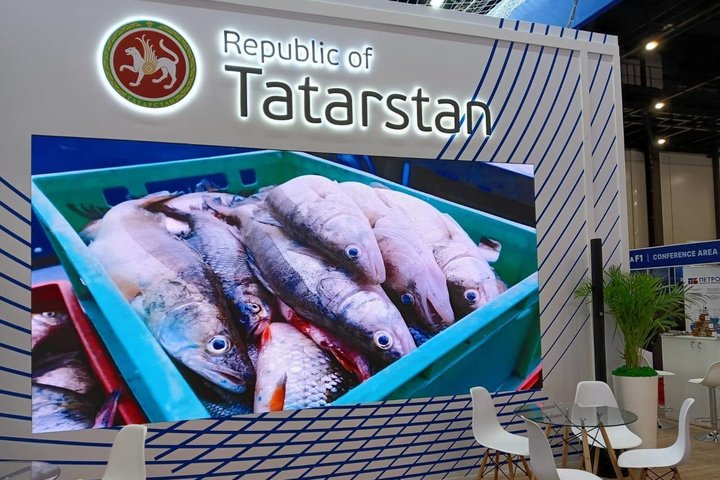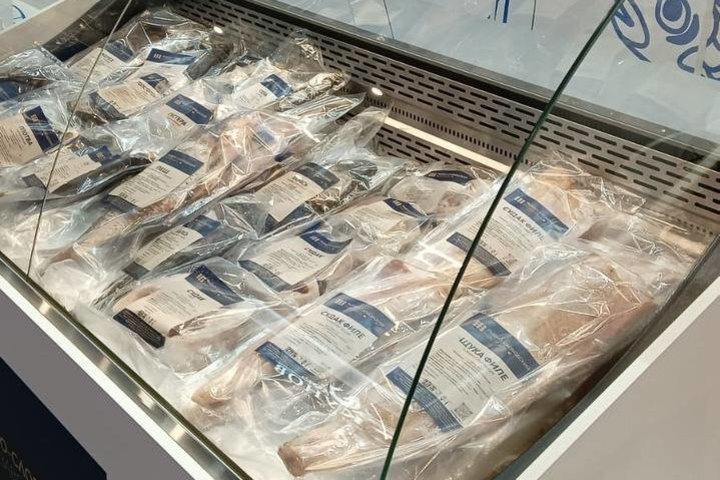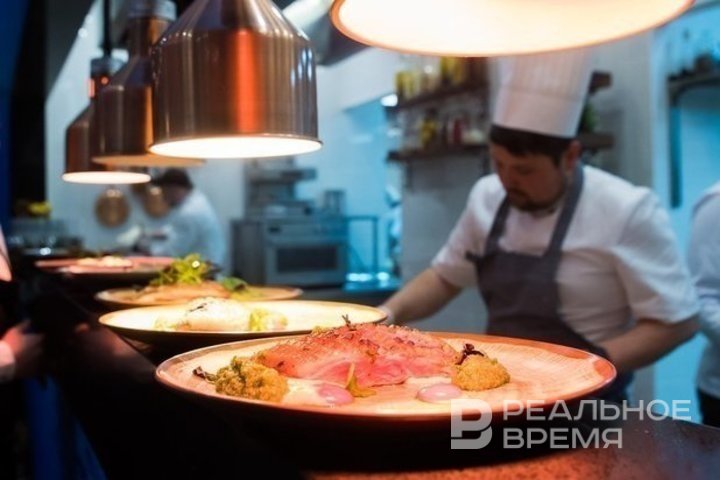‘Fish’ day in St. Petersburg: Tetyushi bream to be sent to Hungary, Tatarstan ready to engage in shrimp business
What Tatarstan fishermen brought to the International Global Fisheries Forum & Seafood Expo Russia in St. Petersburg

“The trend of shrimp farming is gaining momentum at a breakneck pace in the countries of Southeast Asia. They account for almost 40% of all aquaculture in Asia. Russia has also created a similar technology, but only for four harvests a year," fishermen businessmen said at the VII International Global Fisheries Forum & Seafood Expo Russia in St. Petersburg on 17 September. Tatarstan is ready to enter the mainstream — they want to try to introduce the technology of growing jumbo shrimps in large fish factories, the Ministry of Agriculture and Food of the Republic of Tatarstan reported. Meanwhile, the “fish king” from Tetyushi, Tatarstan, Anatoly Podgorny, has signed a long-term export contract with Hungary — their dried bream is included in the national menu. Read the details in the material of Realnoe Vremya.
Malygin's Biosfera-Fish stayed at home
Tatarstan came to the International Fisheries Forum in St. Petersburg in an incomplete composition. Usually the delegation includes the heads of large fish factories of the republic: Tetyushsky, Mamadyshsky, Laishevsky and Rybno-Slobodsky, and representatives of aquatic farms, but this time Vladimir Malygin decided to skip the “summit talks”. The founder of the widely-promoted Biosfera-Fish aquatic complex did not go to the Northern capital, although they had visited the forum more than once before. In a conversation with Realnoe Vremya, he assured that the complex continues to grow juvenile sturgeon, foundation stock, and also releases sterlet fry for compensatory stocking. However, he did not disclose the reason for the non-appearance.
Meanwhile, the VII International Fisheries Forum and the exhibition of the fishing Industry, Seafood and Technologies (Global Fisheries Forum & Seafood Expo Russia) remains the main event of the fisheries industry. Dmitry Patrushev, the deputy prime minister of Russia, German Zverev, the president of the All-Russian Association of Fisheries Enterprises, Entrepreneurs and Exporters, and Ilya Shestakov, the head of the Federal Agency for Fisheries, are expected to visit the exhibition. The main topic of the plenary session will be the discussion of world experience and trends in the development of the fishing industry, as well as new technologies and fishing gear for the competent exploitation of biological resources of the World Ocean.
Giving dried bream
It is clear that Tatarstan does not claim to catch marine fish, but they are no less concerned about river processing technologies and aquaculture cultivation than the Far Eastern regions. The fish exposition of Tatarstan consisted of “slicing” the products of four leading fish factories, which occupy the lion's share of fish processing in the republic: dried bream, smoked slices of trout, walleye, sturgeon, frozen fillet of pike, trout, walleye. The assortment was complemented by fish dumplings and canned river fish.

“Against the background of marine products, local river fish is in great demand," the Tatarstan State Committee for Biological Resources believes. Its head, Fedor Batkov, headed the Tatarstan delegation in St. Petersburg. According to him, Tatarstan is the second in the Volga Federal District in terms of the number of fish caught. 3208.7 kilograms of fish have been sent for processing. There are 13 fishing sites on the territory of the republic, where eight fishing enterprises operate, employing almost 500 people.
The supremacy of dried bream at the stand of Tatarstan turned out to be for a reason. It turned out that by the end of the day, businessman Anatoly Podgorny had signed a long-term export contract with Hungary — his dried bream is on the national menu, the representative of the Ministry of Agriculture of the Republic of Tatarstan told Realnoe Vremya.
How voracious shrimps conquered Asia... and Tatarstan
Given that a significant part of the country belongs to the freshwater, as well as Tatarstan, the boom in interest fell on the technology of growing “marginal” types of aquaculture. And here, one can say, they “go crazy” for shrimps — they grow fast, eat everything they can find, and there is no end to demand for it among restaurateurs.
“There is not a single restaurant in Moscow where there would be no shrimp on the menu. Everyone has them in the form of snacks, main dishes. An ice bowl with a pink shrimp on top is a hit, fashionable, a symbol of freshness," said Alexey Gubaidulin, the co-founder of ALFISH Group of Companies.

Shrimp accounts for 40% of all aquaculture in Southeast Asia.
“It is grown a lot in Asia, this is a growing trend," Gubaydulin said. “It grows in one season, while Asians manage to harvest six crops a year. This is how their technological process is built. We have also created a similar technology — four harvests a year, and the biology of the breed allows it.
The explosive interest is due to the fact that the shrimp eats everything in its path, it is voracious, although light in weight.
“It is a crazy polyphagus," the speaker called it. “It eats constantly and processes it into expensive protein. It is suitable for recirculating aquaculture systems in ponds.
A shrimp business looks more profitable than trout and sturgeon ones. “Sturgeon farming looks tempting, but not for everyone. It's a lot of long money, so not everyone holds on. Many people give up halfway," Alexey Gubaydulin explained.
Another fisherman, Sergey Pivnev from Voronezh, made a bet on the cultivation of crayfish. “Even with a volume of 400 kilograms, operating profit allows the farm to break even. It's not a thousand, it's not a thousand and a half," he argued.

Robert Harvey Stubblebine, president of Russian Seafood, evaluates the prospects of aquaculture much more rigorously. An Englishman from Boston turned out to be in Moscow first, he has been living in Crimea for the last 9 years. With the help of Western colleagues, he built an aquaculture nursery. It sells more than 1 million tonnes of oysters and 200 tonnes of mussels annually.
— If you don't have 100 million rubles and good specialists, then it's better not to start at all. I don't want to alienate anyone, but it requires 150 million rubles," he warned.
Economic efficiency has inspired Tatarstan fishermen. According to the representative of the Ministry of Agriculture and Food of the Republic of Tatarstan, the republic is ready to engage in the cultivation of jumbo shrimp, and they want to try to introduce the technology in large fish factories.